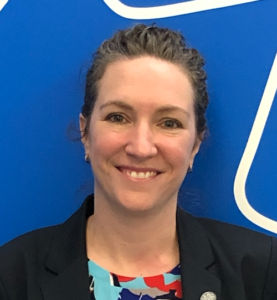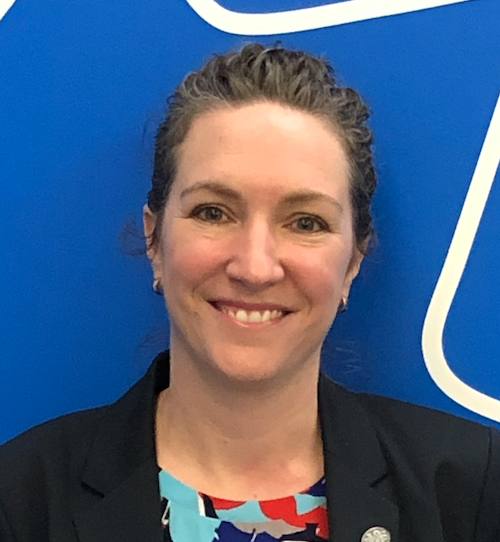Jana Lee Murray started her career in the defence and security industry over 13 years ago by joining CAE Inc. However, her initial connection to the industry began way before at the assembly line at General Motors in Oshawa.
“While working this job to support myself through university, I became familiar with the field of ergonomics and became determined to help make a difference for workers who have dedicated their lives to working in physically challenging fields,” said Murray.

After her undergrad studies, she enrolled in the Masters of Human Kinetics program with a specialization in Ergonomics at the University of Windsor. “My Masters required me to complete an internship, and I moved out to Calgary to work with a company that designed and manufactured operator consoles for mission-critical operations,” she said.
In Calgary, she was introduced to the Association of Canadian Ergonomists where she met her future manager at Greenley and Associates. After working in Calgary with Greenley and Associates, now CAE, she moved to Ottawa to work in the CAE Canada headquarters, where she became much more engaged in defence and security projects.
After spending six years consulting, she transitioned into a global business development role and supported their international teams on complex, multi-purpose training centre pursuits. “My focus has gone full circle and is now back on the Canadian defence sector as Account Manager for the NATO Flying Training in Canada (NFTC) program,” she added.
In 2015, while on maternity leave for her first child, Murray accepted the position of Vice-President of Events for Women in Defence and Security (WiDS). After spending a year in this role on the Executive Committee, she was nominated as President and have held that position for the past three years.
We are excited to announce Jana Lee Murray, Account Manager, CAE and President, WiDS as a Vanguard Game Changer for the December 2018/January 2019 edition. Here is the full interview with her.
What is your role in your organization today?
As Account Manager for the NFTC program, I am responsible for managing the relationship with federal government stakeholders. This includes producing integrated program status updates and reports, managing local governance, and reporting between the government and CAE. I also provide support to a diverse team of CAE Program and Project Managers who are executing the combined deliverables associated with the delivery of the NFTC program.
As President of WiDS, I am responsible for leading the Executive Team to achieve our mandate, which is to support and promote the advancement of women in the defence and security sector. We continue to drive opportunities for our members to meet, learn, and grow by recognizing excellence, developing talent, and creating connections. In my role, I am also responsible for providing strategic direction for the organization and liaising with the Canadian Association of Defence and Security Industries (CADSI).
What was your most challenging moment?
I always find this to be one of the most difficult questions to answer in any interview. I would say my most challenging moment isn’t actually a moment but a constant. As the mother of a five-year-old and two-year-old twins, my biggest challenge is trying to find an optimal work/life balance to both succeed in and continue to climb the ladder in my career while at the same time giving my family the time and energy they deserve.
What was your ‘aha’ moment or epiphany that you think will resonate most with our reader?
Since starting my career, one of the most significant stand-out moments was when the opportunity presented itself to leave my position as a human factors consultant and take a role as a global business development manager. This was a huge change in role and responsibility and took me way out of my comfort zone into an entirely different area of the organization. In addition, I was moving into a completely male-dominated area of this business.
This move turned out to be a career changer as it gave me exposure to the larger business, helped me build relationships with the leadership at CAE, and also gave me the opportunity to pursue business all over the globe. So what was the ‘aha’ moment? Even if an opportunity seems out of reach on the surface, don’t sell yourself short. Sometimes the opportunities that look like a longshot end up being game-changing moments!
What is the one thing that has you most fired up today?
As a woman and the President of WiDS, I am truly heartened by the strides being made by the defence and security industries to sharpen the focus on diversity and inclusion. Through my own experience, I am seeing the passion, commitment, and talent that women of all backgrounds bring to their work. While the progress we are seeing is a reason to get fired up, I recognize that changing the dialogue on diversity and inclusion will not happen overnight and must be complemented by a concerted effort by those within industry and government–men and women–to promote opportunities for all individuals. There is still work to be done, but we’re on the right path.
What is the best advice you’ve received?
The best advice I ever received was to “lean in” and actively seek opportunities, not to wait for them to come to you. There have been many times in my career when I have been the only woman in the room or at the table. The advice to “lean in” taught me not to stand back and let the others in the room dominate the conversation or the room, but to sit at the table, speak up, and ensure my opinion is heard.
What is a habit that contributes to your success?
I wouldn’t necessarily call this a habit–but more of a personality trait. The one thing that I believe most significantly contributes to my success is the emphasis I put on building relationships with both my colleagues and my customers. You can have the best work habits in the world, but without focusing on building and maintaining relationships, I do not believe a high level of success can be achieved.
What people or organizations do you believe best embody the innovation mindset?
Uber is one organization that I feel has truly embodied the innovation mindset. Uber took a market segment that has adopted very little innovation over time and–using technology, innovation and an understanding of their customers’ needs–completely changed the ground transportation industry.
How is your organization changing the game within your industry sector?
WiDS has provided an important platform to help promote the advancement of women in careers related to Canadian defence and security. Initiated by a small group of women keen on “changing the game” in 2005, the organization now has over 2,000 members who work across industry, government, military, police services, and first responder agencies.
By providing professional development opportunities and informal mentoring, we are working to encourage and support women at all stages of their careers. By providing scholarships and fellowships, we are providing an incentive for women to continue their studies in defence and security. By providing networking opportunities, we are creating meaningful connections among like-minded women (and men!). Through these avenues, WiDS is building a powerful network that works together to transform culture in these traditionally male-dominated industries.
We have made significant strides over the past decade, and we are committed to continuing our efforts, with the goal of seeing a sharp increase in the number of women who are working and advancing in these industries in the decades to come.
What are some of the biggest impediments to innovation in your industry sector?
For industry to continue to innovate and more importantly, invest the required internal research and development resources, we need ongoing dialogue and direction from our government and military customers. Industry is more than willing to commit funding and resources to innovation on behalf of our customers, so long as we know the challenges and requirements our customers are trying to address. If we have an open and ongoing dialogue between government and industry, there will not be an impediment to innovation.
How has innovation become engrained in your organization’s culture, and how is it being optimized?
Innovation isn’t just engrained in CAE’s culture; innovation is in our DNA. For over 70 years, CAE has been a technological leader in aviation training, a trait that is underpinned by an innovative mindset and longstanding commitment to R&D. This past summer we launched a five-year internal research and development initiative called Project Digital Intelligence that will see us invest more than $1 billion to transform our products and services to leverage digital technologies. We will be creating solutions that involve big data, artificial intelligence, cloud computing, cybersecurity and augmented/virtual reality. To even further optimize our innovative spirit, CAE has launched an employee initiative called “One Spark” that is leveraging our employee’s own creativity into concrete improvements and new products.
What technologies, business models, and trends will drive the biggest changes in your industry over the next two years?
CAE is well-known for its capabilities in flight training, and the aviation industry–both civil and military–is facing a major challenge with pilot recruitment, training and retention. The training piece of that challenge is where CAE can help because we are in the business of helping produce pilots for our customers. For our military customers, we help our customers make the pilot training pipeline more effective and efficient, which has the ultimate effect of contributing to force generation for our military customers.
What is your parting piece of advice?
I recently attended a WiDS Professional Development event at the Telfer School of Management on “Resilient Leadership”, which focused on the critical importance of “self-care” in being a successful leader. With the seemingly impossible juggle of work and life, it can become far too easy to neglect yourself. This is still something I continuously struggle with, but I whole-heartedly believe that we all need to take a moment for ourselves from time to time to reenergize and refocus. When we do this, we are helping ourselves and becoming more successful business leaders in the process.

